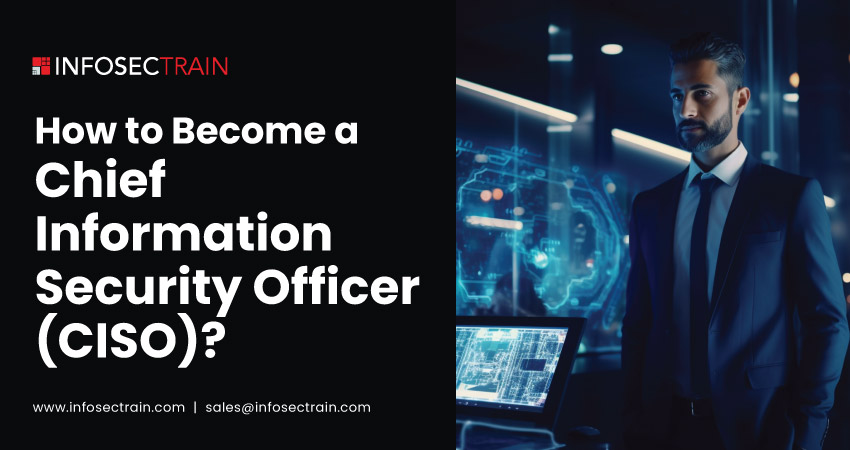How to Become a Chief Information Security Officer (CISO)?
The Chief Information Security Officer (CISO) plays a crucial role in digital security, overseeing a company’s strategies to safeguard sensitive data and ensure secure communication throughout the organization. As a CISO, you’ll be responsible for your organization’s data security and play a crucial part in shaping its business strategy and future direction. Although becoming a CISO is often the ultimate goal in an information security career, it’s never too early to start planning your journey to the executive level, even if you are a novice in this field.

Who is a Chief Information Security Officer?
A Chief Information Security Officer (CISO) is the most senior-level position in a security team. A CISO is accountable for information and data security. They spearhead initiatives to safeguard sensitive information, enforce security protocols, and guarantee compliance with regulations. A CISO oversees cybersecurity strategies, risk management, and incident response. They also play a critical role in aligning security initiatives with business objectives. A CISO is pivotal in safeguarding the organization’s digital assets and infrastructure.
How to Become a Chief Information Security Officer
1. Education: Acquire a bachelor’s degree in Computer Science, IT, or Cybersecurity. Degrees such as a Master’s or MBA in the same discipline give you an added advantage in understanding complex security challenges and making decisions in the field.
2. Professional Experience: Begin your career in entry-level IT roles like IT support or Network Administrator. Progress to intermediate positions such as Security Analyst or Engineer to develop a deep understanding of security practices and principles. As you progress, focus on honing your skills and expanding your knowledge in cybersecurity.
3. Certifications: Achieve industry-respected certifications like CompTIA Security+, EC-Council CEH, ISACA CISM, ISC2 CISSP, EC-Council CCISO to validate your cybersecurity expertise.
- CompTIA Security+: Demonstrates foundational knowledge of security principles.
- CEH: Certifies skills in identifying and addressing security vulnerabilities.
- CISM: Focuses on managing and governing information security programs.
- CISSP: Validates a broad understanding of security practices and management.
- CCISO: Demonstrating advanced skills and knowledge for chief executive-level cybersecurity leadership.
These certifications confirm your expertise and knowledge, demonstrating your adeptness in addressing a broad spectrum of security challenges. Stay updated with the evolving landscape by pursuing additional certifications and staying current with industry trends.
4. Skills Enhancement: Enhance technical skills in penetration testing, threat intelligence, incident response, security architecture, and soft skills like leadership, communication, and strategic planning. This comprehensive skill set is essential for effectively addressing security challenges and leading security initiatives within organizations.
5. Management Experience: Transition to leadership positions like Security Manager or IT Manager to acquire expertise in team and project management and strategic planning. These roles provide valuable experience overseeing security operations and implementing effective security strategies.
6. Networking: Connect with cybersecurity professional associations, attend industry conferences, and remain informed about recent trends and developments. Networking offers valuable chances to learn from industry experts, remain current with best practices, and broaden your professional network.
7. Career Advancement: Advance to senior security roles where you lead larger projects, oversee security departments, and ensure compliance with regulations. These roles demand substantial experience and proficiency in overseeing intricate security projects and efficiently mitigating risks.
8. Preparation for CISO Role: Develop visionary leadership, risk management, and business acumen skills to lead effectively as a CISO. Demonstrate success through impactful security initiatives and industry recognition. This prepares individuals to tackle the strategic challenges inherent in the CISO role.
What a Chief Information Security Officer Does?
1. Developing Security Strategies: Develop and implement comprehensive security strategies and policies to safeguard data and systems against cyber threats. This involves assessing risks, identifying vulnerabilities, and implementing effective countermeasures to enhance overall security posture.
2. Risk Management: Identify, evaluate, and mitigate cybersecurity risks to reduce their impact on the organization. This involves evaluating the probability and potential consequences of threats, deploying measures to reduce risks to an acceptable level, and continually monitoring and assessing the efficacy of these actions.
3. Compliance: Guarantee compliance with relevant laws, regulations, and information security industry standards. This involves staying updated with evolving regulations, conducting regular audits to assess compliance, and implementing necessary measures to meet requirements and avoid penalties.
4. Incident Response: Lead handling security incidents and breaches, overseeing the investigation, containment, and resolution processes. This involves coordinating with internal teams and external stakeholders to minimize damage and prevent future occurrences through lessons learned.
5. Security Awareness: Promote a security-conscious culture and educate employees to identify and respond to security threats. This involves organizing training sessions, promoting security best practices, and cultivating a proactive cybersecurity culture within the organization.
6. Vendor Management: Manage the security aspects of third-party vendors and service providers to verify compliance with security standards. This involves assessing vendor security protocols, conducting evaluations, and implementing measures to minimize risks associated with outsourcing critical services.
7. Security Architecture: Create and deploy strong security frameworks to defend systems and networks against cyber threats. This involves creating architecture that integrates security measures like firewalls, encryption, and access controls to uphold data integrity and confidentiality.
8. Security Monitoring: Establish systems to continually monitor network traffic, system logs, and security alerts for immediate threat detection and response. This proactive approach helps identify and mitigate potential security breaches in real-time, minimizing their impact on the organization.
9. Budgeting and Resource Allocation: Oversee budgeting and resource allocation for cybersecurity efforts, including investing in technology, personnel, and training. This involves optimizing spending to enhance security posture and aligning resources with organizational goals to manage cybersecurity risks effectively.
10. Reporting: Update senior management and stakeholders regularly on the organization’s security status, including risks, incidents, and compliance. This ensures that the organization enables informed decision-making to address security challenges effectively.
CISO with InfosecTrain
InfosecTrain provides top-notch certification training in information security, offering a range of programs to support career advancement. Their Certified CISO (C|CISO) training is designed for individuals aspiring to become Chief Information Security Officers (CISOs). This program enjoys global recognition and aims to equip participants with essential skills to lead security initiatives in organizations effectively. It is highly regarded in the industry for its comprehensive approach to addressing modern cybersecurity challenges. The training emphasizes strategic planning, effective risk management, and strong leadership, making it an ideal choice for those seeking to excel in information security.
TRAINING CALENDAR of Upcoming Batches For CCISO
| Start Date | End Date | Start - End Time | Batch Type | Training Mode | Batch Status | |
|---|---|---|---|---|---|---|
| 07-Jun-2025 | 13-Jul-2025 | 09:00 - 13:00 IST | Weekend | Online | [ Open ] |







 1800-843-7890 (India)
1800-843-7890 (India)